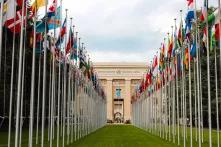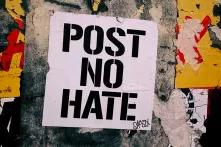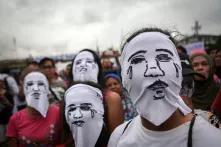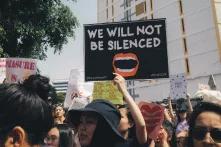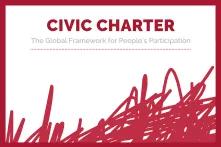All human beings are born equal in dignity and rights – regardless of where they come from, where they live, what they look like, whom they love, what language they speak, their gender, their religious or political beliefs, their social or economic status or in whatever way they may be different. The Heinrich Böll Foundation is committed to ensuring that all people know their rights, which they can demand and defend.
Spot on Human Rights
"All human beings are born free and equal in dignity and rights." This was proclaimed on 10 December 1948, by the United Nations General Assembly in Paris, when the community of world states adopted the Universal Declaration of Human Rights (UDHR). Since then, the UDHR served people around the world as an anchor to fight for their freedom, dignity and equality, and to urge and oblige rulers, those in power and political and economic actors to respect the rights and dignity of all human in everything they do.
Defending Human Rights!
In many countries around the world, civil society is under pressure and human rights defenders are at risk. This also affects partners of Heinrich Böll Foundation and the foundation puts the topic of shrinking civic spaces on the political agenda in order to encounter the trend with a human rights-based approach.
Democracy and Human Rights
Democracy is not an automatic success. Democracy must be fought for, revitalized, and renewed. Throughout the world people are standing up for political, economic, and cultural rights. Many of these advocates of political freedom take great personal risks. Supporting democratic engagement worldwide is a core concern of the Heinrich Böll Foundation. Human rights, democracy, and ecology – this triad stands at the center of our international work.
Women's Rights are Human Rights
On December 18th 1979, the Convention on the Elimination of All Forms of Discrimination against Women (CEDAW) was adopted in by the United Nations General Assembly. Our authors sum up the contributions CEDAW has made to the position, rights and everyday life of women in these countries and outline what is left to be done.
LGBTI rights are Human Rights
People should be free to choose their sexual orientation and gender identity. Therefore, the support of lesbian, gay, bisexual, trans* and inter* (LGBTI) persons is integral to the Heinrich Böll Foundation. Because, when the rights of people are restricted due to their way of life or orientations, in everyday life, due to a lack of protection or even due to active discrimination by the state and institutions, then there is usually a problem with the protection of other rights and the state of institutions. And that affects all citizens in other areas of life as well.
Business and Human Rights
Everywhere along production and supply chains, human rights are disregarded. Be it when companies acquire land, displace people and not compensate them adequately or when production conditions are inadequate, when the exploitation of resources pollutes and destroys people's groundwater and natural basis of existence. Companies often also cooperate with authoritarian regimes and help them trample on the human rights of their populations. Thus, the economic actors also have a responsibility when it comes to respecting human rights.
Right to Human Rights
It is not easy to enforce human rights before court – but it is possible. Whether by relying on national or international law, through the International Criminal Court or special tribunals, economic actors and those in power violating human rights can be held accountable. Also, courts often help to oblige governments to make the normative obligations of human rights a reality in their policies and national legislations. Here, we show a few examples of where this works.
Digital Technology and Human Rights
The rise of digital technology continues to have serious impacts on human rights worldwide. Digital surveillance, remote work, and online political participation can promote human rights, as well as endanger them. Yet, what should be our response to these contemporary developments? The International Democracy Programme has partnered with Tactical Tech for the production of the Digital Technology and Human Rights series for our Web dossier “Human Rights 2020” in order to answer this question.

